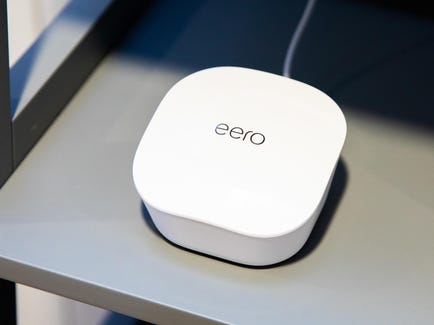Nest Wifi vs. Eero: Which mesh network do you want?
Google-owned Nest and Amazon-owned Eero each have new mesh routers up for sale. Which one's the better bet to blanket your home in Wi-Fi?

Like
- The Google Nest Wifi is an excellent mesh router system with impressive top speeds, strong performance at range, easy-to-use features and stable band steering
- The range-extending Nest Wifi Points come in your choice of three colors and double as Google Assistant smart speakers.
Don't like
- Similar mesh systems with comparable coverage can be had for less than half as much
- Unlike the range extenders, the Nest Wifi Router only comes in white, and it only includes a single spare Ethernet jack.

Like
- Excellent value for a three-piece mesh system
- Easy, app-based setup with automatic security updates
- Stable mesh performance with no drops in any of our tests
Don't like
- Limited top speeds and range from each individual device
- No Wi-Fi 6 or WPA3 security support
- No special integrations with Alexa
Google and Amazon each released new mesh router systems late last year: The Google Assistant-equipped Nest Wifi and the new Eero Mesh Wi-Fi System. Both are new versions of existing mesh systems that have tested well here at CNET, and they arrive at a time when multipoint mesh router setups seem to be gaining traction with people fed up with the dead spots in their home Wi-Fi networks.
We've tested and reviewed each system, and each one currently has a place on our list of the best mesh routers available now. But how do you choose between the two?
Glad you asked. Let's take a look at the finer points separating each system in order to help you pick one out.
Locating local internet providers
Read more: The best Wi-Fi routers in 2019
Google's Nest Wifi is a refreshed, second-gen version of the Google Wifi mesh system that came before it. Available now, the rebranded Nest version adds in a new, marshmallowy design in your choice of three colors, faster top speeds and, most interestingly, microphones and speakers in each of the range-extending Nest Wifi Points.
The built-in audio hardware lets you use each of those Wifi Points, just like any of Google's other smart speakers, so you'll spread the Google Assistant's footprint throughout your home as you spread a stronger Wi-Fi signal with it. Along with the full range of Google Assistant commands, you'll also be able to ask the mesh system to run a quick speed test, or to pause the Wi-Fi for a device or group of devices on your network, which might come in handy for the parents of unruly children.
The Nest Wifi is an AC2200 mesh router system. The "2200" part tells you the combined speed of each of the router's bands, which comes in at about 2,200 megabits a second. Your actual connection will be a lot lower than that since you can only connect to one band at a time. Still, it's a noticeable top speed improvement over Google Wifi from three years ago -- that system was an AC1200 router.
The unchanged "AC" part merits a mention, too. That's short for 802.11ac, the technical name for current-gen Wi-Fi 5 connections. The new, speedier version of Wi-Fi, 802.11ax, is just starting to hit the market under "Wi-Fi 6" branding, but Google decided to stick with Wi-Fi 5 to keep costs down. Then again, so did Eero. Now, in 2020, a number of new, similarly priced competitors offer full support for Wi-Fi 6 -- you can read about all of them in my best mesh routers rundown.
Google did increase the number of antennas inside of the Nest Wifi router to four, though, which allows it to support 4x4 MIMO connections on the 5GHz band. If you're using a device with multiple antennas of its own, like the 3x3 MIMO MacBook Pro, you'll be able to receive data from the router on multiple antennas at once. The new version of Eero sticks with a more limited 2x2 MIMO design, so give Google a point here.
As for speeds, when we wired the Nest Wifi router to a local server and then downloaded data from that server onto our test laptop, we clocked the top transfer speeds at close range and with minimal interference at 612Mbps. Eero's number was lower -- 488Mbps -- and speeds fell off considerably more at range than we saw with Nest.
That said, your actual speeds will depend on the layout of your home, the devices you're using, and the speed of your incoming internet connection. In my 1,300 sq. ft. home, where I pay for ISP speeds of up to 300Mbps, a two-piece Nest Wifi setup yielded average download speeds of 222Mbps when I tested it across five rooms at varying distances from the router and averaged everything together. Eero's average was slightly slower at 204Mbps. Eero also saw more of a speed dip at range, with download speeds in the back of my house that were about 60% slower than speeds in the front, where the router was located. With Nest, that drop-off was only 40%.
The Nest Wifi Router is available as a standalone device for $169 (£149, AU$269), but you'll almost certainly want to get it with at least one Nest Wifi Point to extend the range and take advantage of the smart speaker functionality. Google offers a starter kit with the Nest Wifi Router and a single Wifi Point for $269 (£239, AU$399), and claims that the duo is capable of covering homes of up to 3,800 square feet. Additional Wifi Points cost $149 (£129, AU$229) each. And note that sales on Nest Wifi aren't too hard to come by in 2020, which is likely thanks to all of the new competition.
Eero was a pioneer in mesh networking that made a name for itself with popular, multipoint Wi-Fi systems capable of slinging a steady signal to every corner of your house. At $400 or more, those systems didn't come cheap, but they tested well, earning solid reviews and also the attention of Amazon, which moved to acquire Eero early in 2019.
Amazon made quick work of releasing a new, less expensive version of the Eero mesh system, doing so just in time for last year's holiday buying season. At $249 for a three-piece setup (one unit to plug into your modem and serve as the main router, plus two identical devices to place around your home), it's half the cost of the existing three-piece Eero Pro system. That's an aggressive bid to win customers at a time when mesh seems to be catching on.
Eero doesn't specify the exact speed of its dual-band mesh system on the product page, the product packaging or even the fine print on the product itself, but it claims that the system is best for homes with internet connections of up to 350Mbps.
That claim seemed to line up with our speed tests for Eero's earlier-generation hardware, with average wireless speeds that never exceeded 200Mbps when we were connecting via one of the satellites and not to the core router itself. When I tested the new system out in my home, with that 300Mbps ISP connection, I had a similar experience. Speeds clocked in well above 200Mbps in the rooms closest to the router, but fell closer to 150Mbps in the back half of the house, where I was connecting through a satellite.
Still, Eero uses a proprietary approach to mesh networking called TrueMesh that seems robust and well-developed. It didn't drop any connections in any of my tests, though Google is good at managing mesh connections, too. Eero also does a commendable job of providing a steady stream of automatic software updates aimed at keeping the system running smooth and secure.
I also appreciate that each Eero unit comes with two Gigabit LAN ports. That lets you wire two units together if you'd like, and it gives you plenty of places to plug in a smart home hub or a media streamer. Nest Wifi only includes two Gigabit LAN ports on the router itself. The Wifi Points don't include LAN ports at all.
As for smart home integrations, the Eero system works with Amazon's voice assistant Alexa, which lets you ask to pause Wi-Fi to a device, or to tell you which Eero unit your phone is closest to the next time you're having trouble finding it. You won't find Alexa living in any of the Eero units, though -- these devices don't double as smart speakers like the Nest Wifi Points.
Where Eero really shines -- particularly at the new, lower price of $249 -- is in simplicity and range. It's quick and simple to set up using the Eero app, and the three units in the starter kit promise to cover a home of up to 5,000 square feet. You'd need to spend $349 to get a three-piece Nest Wifi setup with the same coverage claim. (They're not available in the UK or Australia.)
Like with Nest, it isn't tough to find Eero's system on sale this year. As of writing this most recent update, in April of 2020, the three-piece Eero system pictured above is on sale for just $199, which is a steal. If you live in home that's bigger than 3,000 sq. ft. or so, then there's a good chance that the third device you'd get with Eero would have a bigger impact on the quality of your whole-home connection than the slightly higher top speeds you'd see from a two-piece Nest setup. That's why Eero sits as my top pick for large-sized homes on our rundown of the best mesh routers available now.

